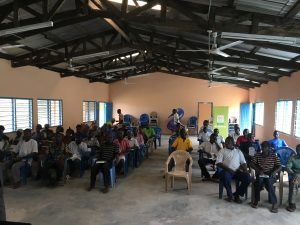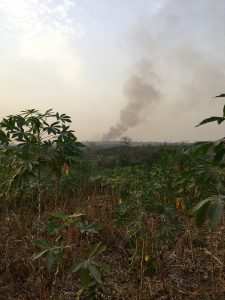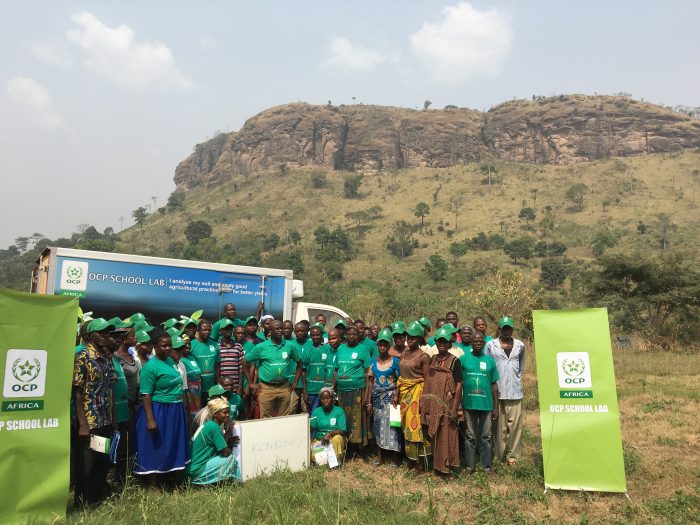The long and dusty truck ride is over. I arrive in Konkoney to the site of a mountain with a protruding rock-face. It was early and the air was still cool. I am with OCP Africa, a private company out of Morocco that tests farmers’ soil for free, then recommends/sells fertilizer based on the results. This company, although for profit, reminisces the Green Revolution spurred by Norman Borlaug. We are in a community where the nearest paved road is almost 45 minutes away and there is no electricity or cell service. Here, fertilizer and improved genetics are relatively foreign to farmers, the same ingredients that Norman Borlaug used to begin the Green Revolution some 60 years ago. OCP Africa is determined to improve soil fertility and improve yields. They travel with Ministry of Food and Agriculture  (MOFA) extension agents that introduce them to the community stakeholders and arrange workshops. Of course, I jumped at the invite to ride along and observe the workshop in Konkoney. By the end of the day I built a relationship with Eric, an OCP field manager, and extended an invite to guest speak at a 4H meeting in Mensah Dawa. Most of my students do not know of other jobs within agriculture outside of farming. This could be monumental in altering a student’s mindset and even career. From meeting with farmers with OCP Africa to organizing meetings on my own, this is what I love.
(MOFA) extension agents that introduce them to the community stakeholders and arrange workshops. Of course, I jumped at the invite to ride along and observe the workshop in Konkoney. By the end of the day I built a relationship with Eric, an OCP field manager, and extended an invite to guest speak at a 4H meeting in Mensah Dawa. Most of my students do not know of other jobs within agriculture outside of farming. This could be monumental in altering a student’s mindset and even career. From meeting with farmers with OCP Africa to organizing meetings on my own, this is what I love.
Since the end of last year I have held monthly farmer meetings, slowly gaining their trust and interest of local  farmers resulting in a higher attendance every time. At these meetings we discuss various issues facing farmers, from one that I believe is the greatest threat to farming in all of Africa, soil erosion, to long-term crop storage. I do not have the answers to all the issues, which at first I arrogantly thought I did. I consult MOFA extension agents on a weekly basis about all facets of tropical agriculture. Previously, I had what I would consider utopian goals for farmers to pursue such as planting an acre of cocoa or half acre of vegetables. This isn’t a feasible investment when you are worried about simply feeding your family or paying your child’s school fees. We have to start small and work from there. For example, instead of a half acre of cabbage, a square meter garden of cabbage by the house is a more practical option. It has been difficult for me to get away from these utopian goals and sometimes it frustrates me how slow progress is. Personally, I have grown to be more patient and understanding over these past 6 months. I sit down with farmers, neighbors, and my chief to hear what issues they face and then contemplate what options there are with what resources are available. I bounce ideas off extension agents and see if they have come across this issue and what solutions they have. Another challenge I face is presenting knowledge on a level that they understand. This can sometimes be the most difficult, for example explaining what is at stake if soil is eroded. The coming rainy season, land preparation, crop rotation and Fall Army Worm control dominate discussion within the MOFA office and at farmer gatherings.
farmers resulting in a higher attendance every time. At these meetings we discuss various issues facing farmers, from one that I believe is the greatest threat to farming in all of Africa, soil erosion, to long-term crop storage. I do not have the answers to all the issues, which at first I arrogantly thought I did. I consult MOFA extension agents on a weekly basis about all facets of tropical agriculture. Previously, I had what I would consider utopian goals for farmers to pursue such as planting an acre of cocoa or half acre of vegetables. This isn’t a feasible investment when you are worried about simply feeding your family or paying your child’s school fees. We have to start small and work from there. For example, instead of a half acre of cabbage, a square meter garden of cabbage by the house is a more practical option. It has been difficult for me to get away from these utopian goals and sometimes it frustrates me how slow progress is. Personally, I have grown to be more patient and understanding over these past 6 months. I sit down with farmers, neighbors, and my chief to hear what issues they face and then contemplate what options there are with what resources are available. I bounce ideas off extension agents and see if they have come across this issue and what solutions they have. Another challenge I face is presenting knowledge on a level that they understand. This can sometimes be the most difficult, for example explaining what is at stake if soil is eroded. The coming rainy season, land preparation, crop rotation and Fall Army Worm control dominate discussion within the MOFA office and at farmer gatherings.
Working with farmers is my passion, above all. Whether it is diagnosing a watermelon pathogen in Los Banos, CA or a cashew pathogen in Mensah Dawa, Ghana, this is what I live for and what gets me up in the morning. Eventually, we plan to arrange a field day for farmers and the 4H Club. Using our 4H farm as a learning tool with sessions led by students. I hope to transfer my knowledge to my 4H members, many of whom I would consider farmers, themselves, and to learn to learn from them, as well. Youth are early adopters of technology and information and by motivating them in the field of agriculture, we will bring forth a new generation of Ghanaians that look at agriculture as a science and as a business, and who will one day be the future of agricultural education.
Ryan Tomlin received a degree in Plant & Soil Science from Texas A&M University. Before becoming an AgriCorps Fellow Ryan worked as an agronomist for Robinson Fresh in the southwestern U.S. and Mexico.


